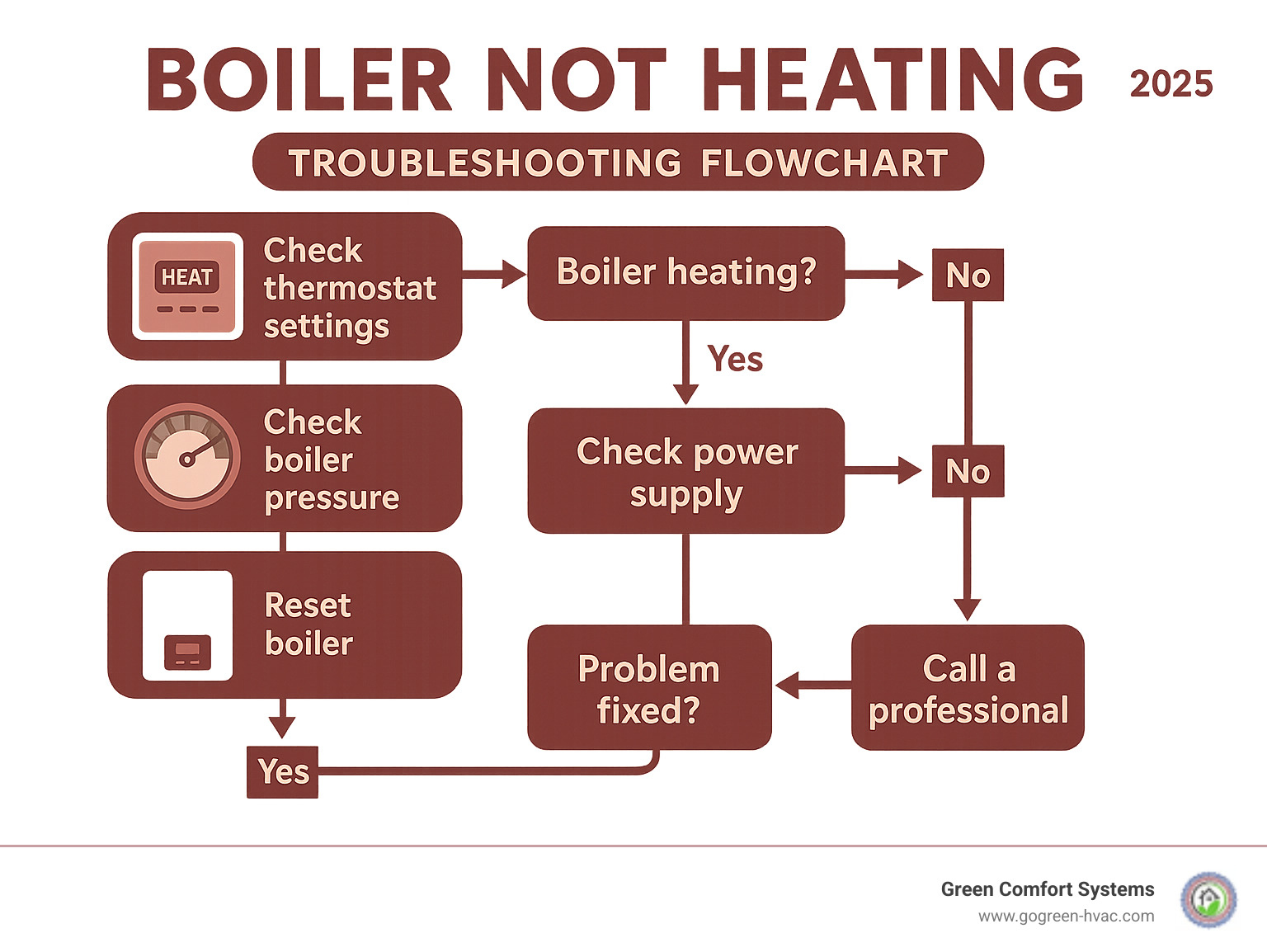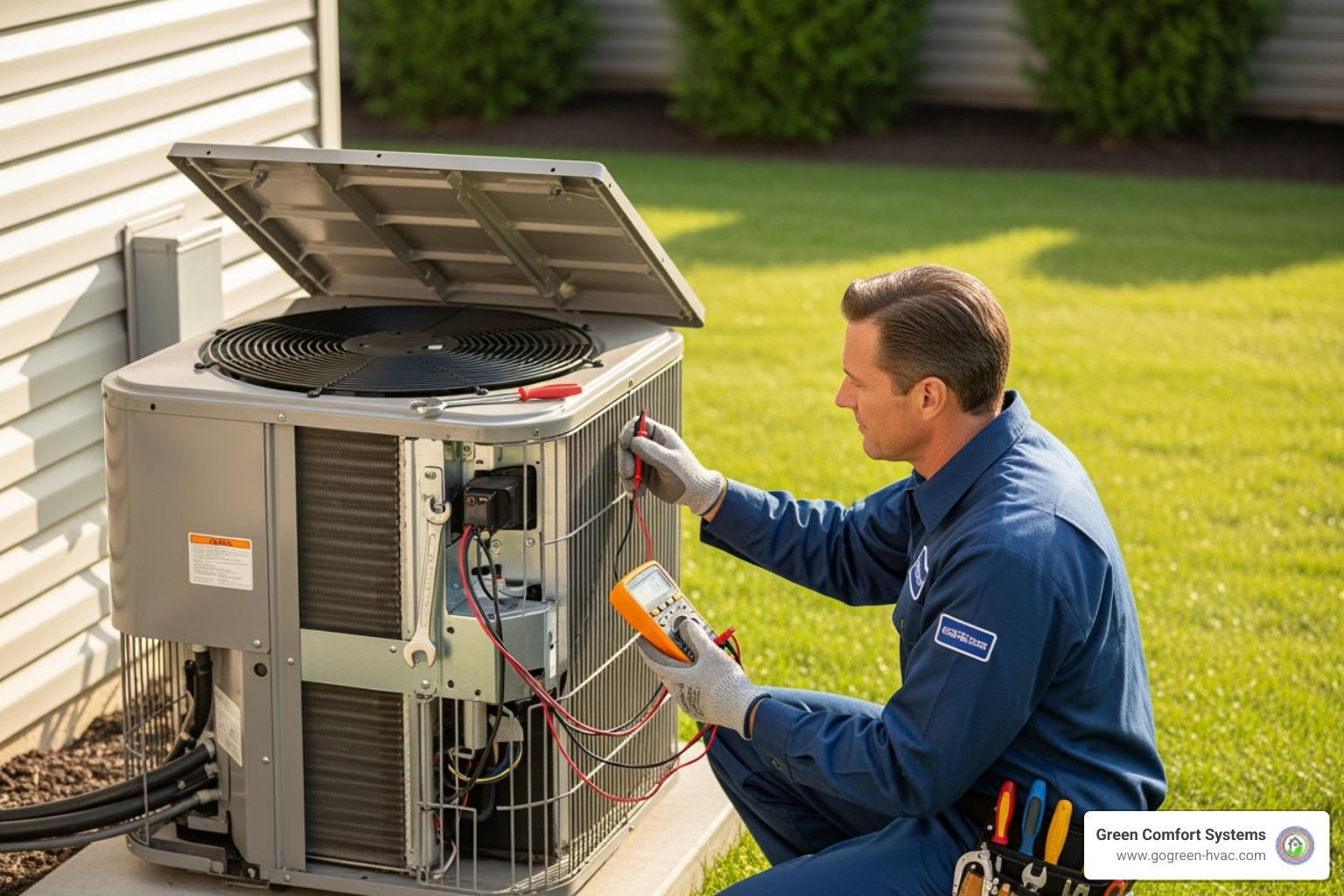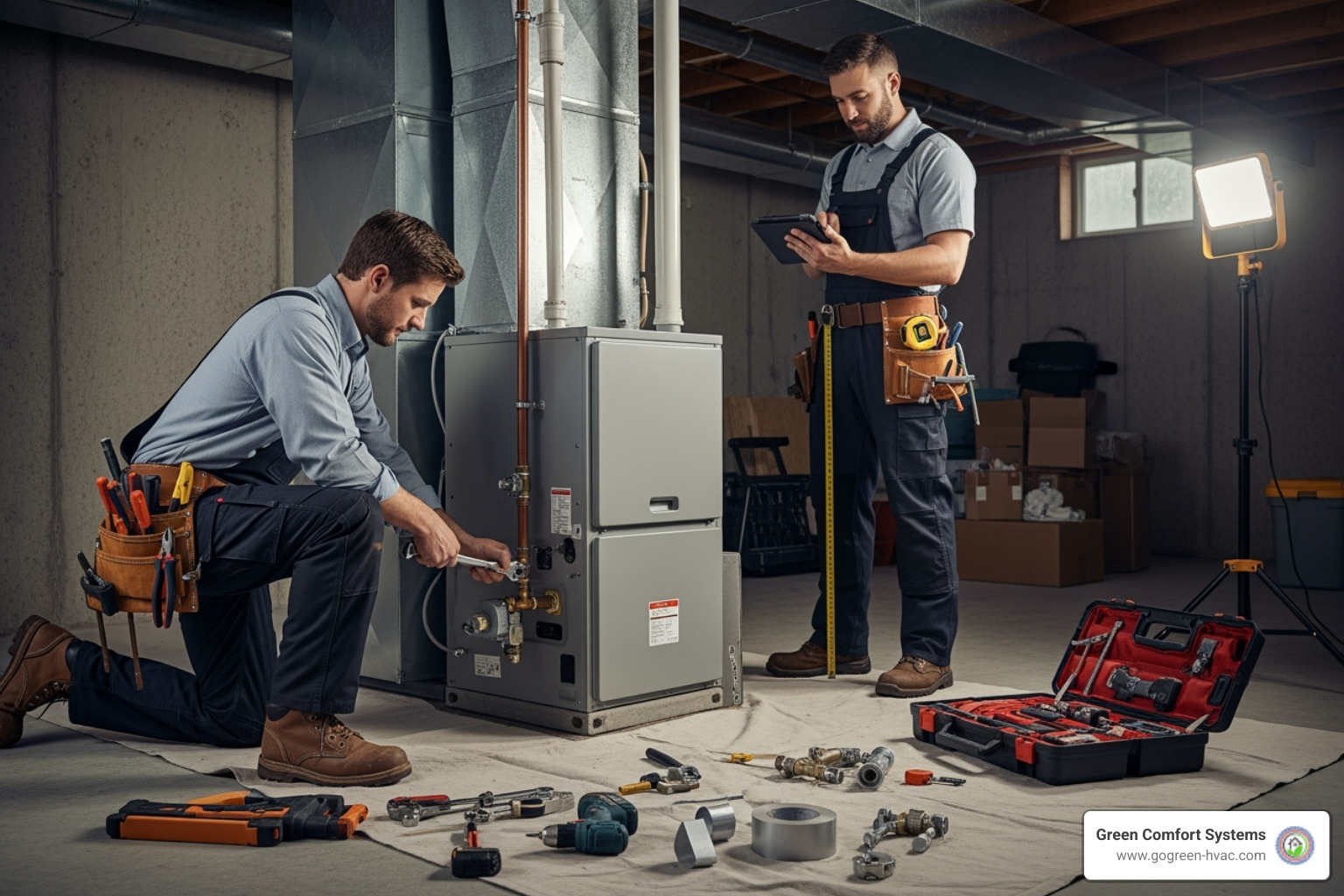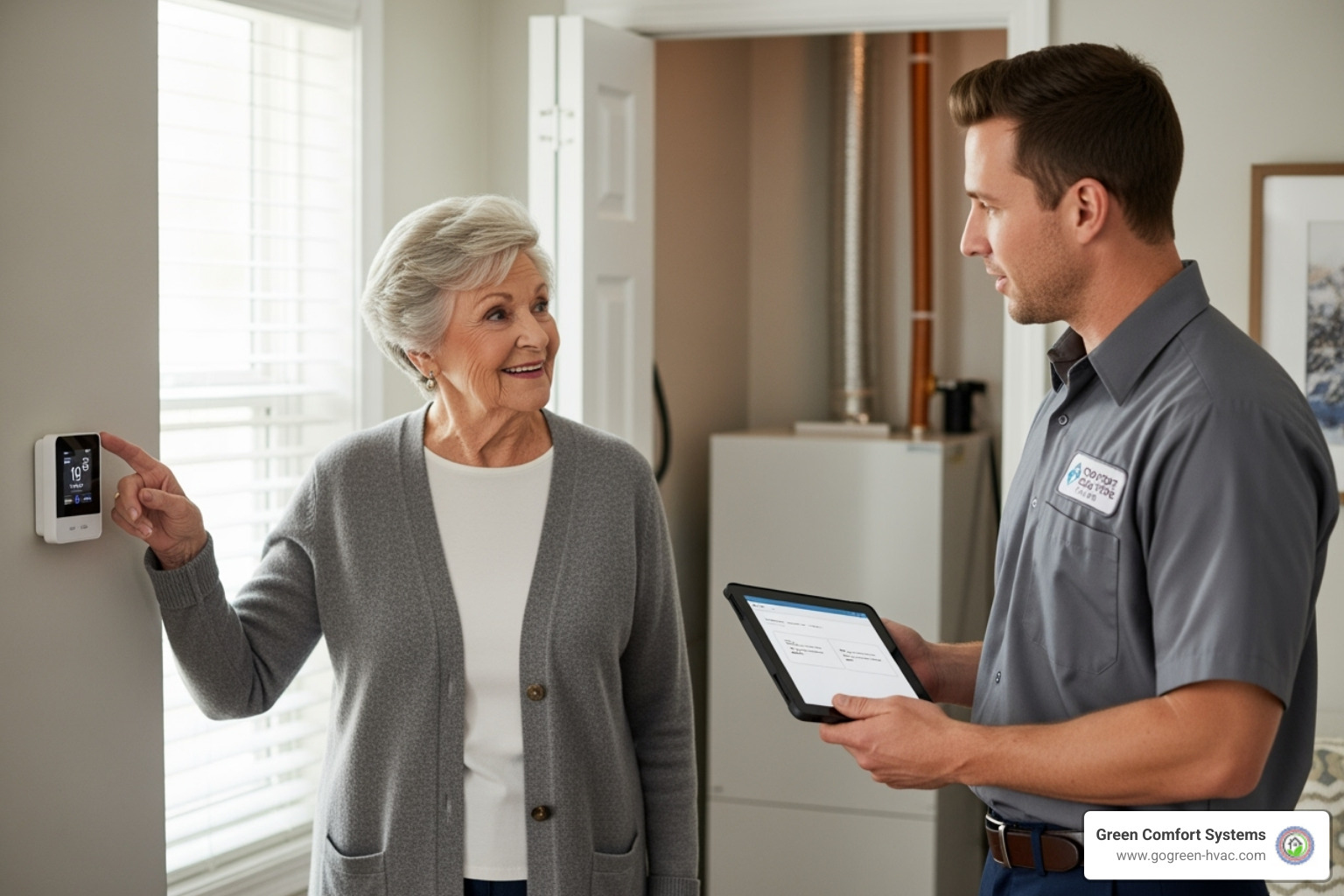Is Your Boiler Working But Radiators Aren't Heating? Here's the Scoop

When Your Boiler Won't Heat Your Home: Quick Diagnosis Guide
Boiler not heating is one of the most frustrating problems homeowners face, especially during Maryland's cold winter months. You turn up the thermostat, hear the boiler fire up, but your radiators stay ice cold while you're left shivering in your own home.
Here's what to check first when your boiler isn't heating:
Immediate Checks:
- Thermostat settings - Is it set to "Heat" and at the right temperature?
- Boiler pressure - Should be between 1-1.5 bar on the gauge
- Power supply - Check if the boiler is actually switched on
- Pilot light - For older boilers, make sure it's lit
Common Quick Fixes:
- Reset your boiler using the reset button
- Top up low boiler pressure using the filling loop
- Replace thermostat batteries
- Thaw frozen condensate pipes with warm water
When to Call a Professional:
- Gas smell or suspected gas leak
- No power to the boiler at all
- Water leaking from the boiler
- Boiler making unusual noises
The good news? Many boiler heating problems have simple solutions you can try yourself. But knowing when to stop and call a Gas Safe engineer is just as important for your safety.
Whether it's a stuck diverter valve, trapped air in your radiators, or just low system pressure, we'll walk you through the most common causes and fixes so you can get your home warm again.

First Steps: Simple Checks You Can Do Yourself
When your home is cold, don't panic. Many boiler not heating problems have simple solutions you can handle yourself. Before calling a professional, let's go through some basic checks that take just a few minutes and require no special tools.
Simple Fixes for a Boiler Not Heating
Start with the most common culprits, which are often overlooked in a moment of frustration.
- Thermostat Settings: Is it set to "Heat"? Is the target temperature higher than the current room temperature? Someone may have accidentally changed the settings.
- Thermostat Batteries: If your thermostat has batteries, replace them. Weak batteries may not have enough power to signal the boiler, even if the display is on.
- Programmer Settings: Check if the programmer is set to "hot water only" or if the heating timer is off. Modern systems can sometimes be set incorrectly.
- Boiler Reset: Try resetting your boiler. Use the reset button on the control panel or turn it off at the mains for 30 seconds, then turn it back on. This can clear minor electronic glitches.
Is Your Boiler Pressure Too Low?
Your boiler's pressure gauge should read between 1 and 1.5 bar. If it drops below 1 bar, the boiler will shut down as a safety precaution. Low pressure means the water can't circulate properly through your heating system.
To fix this, you'll need to use the filling loop to top up the pressure. This is a small braided hose or lever that connects your heating system to the water supply. Consult your boiler's manual for specific instructions, but the process generally involves slowly opening valves to let water in while watching the gauge. Once it's back in the green zone (1-1.5 bar), close the valves.
Note: If you have to repressurize your system frequently, you likely have a leak. In that case, it's time to call a professional to find and fix it.
Dealing with a Frozen Condensate Pipe
In cold Rosedale winters, the condensate pipe—a small plastic pipe carrying wastewater from your boiler to an outside drain—can freeze, causing a blockage. Your boiler may show an error code or shut down completely.

To thaw it, pour warm water (not boiling, as it can crack the pipe) over the frozen section or wrap it with a hot water bottle. Once the ice melts, the boiler should reset. To prevent it from happening again, insulate the external part of the pipe with foam lagging.
Pilot Light Problems in Older Boilers
If you have an older boiler (15+ years), it may have a pilot light, a small, continuous flame that ignites the main burner. If this flame goes out, you'll have no heat or hot water.
To relight the pilot light, check your manual for specific instructions. Typically, you turn a knob to "pilot," press it in, and use an igniter button or a long match to light the flame. Hold the knob for about 30 seconds to heat the thermocouple, a safety device that shuts off the gas if it doesn't sense a flame.
If the pilot light repeatedly goes out, the thermocouple may be faulty. However, first check that your other gas appliances are working to rule out a gas supply issue.
Safety first: If you smell gas at any point, stop immediately. Do not light anything, and call a professional right away.
Why Your Boiler is Not Heating: Common Culprits and Deeper Problems
If the quick fixes didn't work, your boiler not heating problem might be due to a deeper issue. These problems often involve internal components like diverter valves or blockages from system sludge. Your boiler might sound like it's working, and you may even have hot water, but your radiators remain cold. Let's explore these heating mysteries.
Radiators Not Heating Up: Troubleshooting Cold Spots
If some radiators are warm while others are cold, or if they are hot at the top but cold at the bottom, each pattern points to a different issue.
Trapped air is a common cause of cold spots at the top of radiators. Air rises and gets trapped, blocking the flow of hot water. You can release this air yourself by bleeding the radiator.

First, turn off your heating system. Use a radiator key to slowly turn the bleed valve at the top corner of the radiator counterclockwise. You'll hear a hissing sound as air escapes. Once water starts to drip out, tighten the valve. Remember to check your boiler pressure after bleeding radiators, as you may need to top it up.
If radiators are cold at the bottom and warm at the top, the cause is likely sludge buildup. This heavy debris settles at the bottom, obstructing circulation. This problem typically requires professional help.
Also, check your Thermostatic Radiator Valves (TRVs). These can get stuck or be turned down too low, preventing a radiator from heating up.
The Diverter Valve: When You Have Hot Water But No Heat
A common puzzle is having hot water at your taps but no central heating. This often points to a problem with the diverter valve, especially in combi boilers.
The diverter valve directs hot water to either your taps or your radiators. If it gets stuck in the hot water position, your heating system will not receive any hot water, even though the boiler is firing up. You'll hear it working, but the radiators stay cold.
Fixing a diverter valve is not a DIY job, as it's located inside the boiler's sealed casing. It requires a Gas Safe certified engineer to safely repair or replace the part. Once fixed, your heating should return to normal.
Sludge and Debris: Is Your System Clogged?
Over time, rust and dirt can form a thick heating system sludge inside your pipes and radiators. This can cause several problems.
- Kettling noises: Rumbling or banging sounds from your boiler are often caused by sludge restricting water flow in the heat exchanger, causing it to overheat.
- Cold spots at the bottom of radiators: As mentioned, sludge settles at the bottom of radiators, blocking hot water circulation.
The best solution for severe sludge is a power flush, a professional deep-cleaning process that removes the buildup. To prevent future issues, a magnetic filter can be installed. This device captures metallic debris before it can settle and cause blockages, protecting your system in the long run.
Understanding Common Boiler Error Codes
Modern boilers often display error codes on their digital screens when your boiler not heating correctly. These codes are a diagnostic tool that helps identify the root of the problem. While codes vary by manufacturer (always check your boiler manual), they generally point to specific types of faults.
Understanding these codes can help you determine if it's a simple fix you can do yourself or if you need to call a professional. Having the error code ready when you call us can speed up the diagnosis and repair process.
Here are some of the most common types of error codes and what they typically mean:
| Error Code Type | General Meaning | Recommended Action |
|---|---|---|
| Low Pressure | System pressure is below the optimal range (e.g., below 1 bar). | Repressurize the boiler using the filling loop. If pressure drops again, check for leaks. |
| Ignition Failure | The boiler failed to ignite (no flame detected). | Check that your gas supply is on. May indicate a faulty igniter or gas valve. |
| Fan Fault | A problem with the fan that expels exhaust gases. | This is a safety issue. Could be a faulty fan or blocked flue. Requires a professional. |
| Overheat/High Limit | The boiler's internal temperature exceeded safe limits. | Often caused by poor circulation (pump fault, blockages). The boiler will lock out for safety. |
| Water Flow Issue | Insufficient water flow detected through the heat exchanger. | Could be a faulty pump, blockages, or airlocks in the system. |
| Sensor Fault | An internal temperature or pressure sensor is malfunctioning. | The boiler cannot operate correctly without accurate readings. Requires professional repair. |
| Frozen Condensate | The condensate pipe is blocked by ice. | Thaw the pipe with warm water and insulate it to prevent recurrence. |
| No Communication | The boiler isn't receiving a signal from the thermostat. | Check thermostat batteries, wiring, and settings. |
Low pressure and ignition failure codes are among the most common. While you can often fix low pressure yourself, ignition and fan faults point to more serious issues that need an expert.
These error codes are safety features designed to protect you and your boiler by shutting down when something is wrong. It's better to be safe and cold than to risk an unsafe heating system.
When to Call a Professional
While many DIY tips can solve a boiler not heating issue, some problems require professional expertise for safety and technical reasons. At Green Comfort Systems, we prioritize your safety above all else.
Safety First: Don't DIY These Repairs
Certain boiler problems are non-negotiable and require an immediate call to a professional. Never attempt to fix these issues yourself.
- Gas Leaks: If you smell gas (a "rotten egg" odor), turn off your gas supply at the meter if it's safe to do so. Open windows, evacuate everyone from the house, and call your gas emergency service from outside. Do not use any phones or touch electrical switches inside.
- Carbon Monoxide Dangers: This colorless, odorless gas is deadly, and a faulty boiler can be a source. If your carbon monoxide detector alarms, treat it as an emergency. Evacuate immediately and call for help. You can learn more about the risks from the CDC's guide on Carbon Monoxide Poisoning. Do not re-enter until professionals declare it safe.
- Electrical Faults: If the boiler has no power or you see signs of electrical issues, do not investigate yourself. Water and electricity are a dangerous combination, especially if there are water leaks near electronics. Turn off the power at the breaker and call us.
- Internal Component Failures: Replacing parts like diverter valves, pumps, or heat exchangers requires specialized training and tools. Attempting these repairs can be dangerous and may void your warranty.
Repair or Replace? Making the Right Call
If your boiler frequently needs repairs, you may face the decision of whether to repair it again or replace it. Here are key factors to consider:
- Boiler Age: If your boiler is over 15 years old, replacement is often the more cost-effective choice in the long run. Its efficiency will have declined, and parts may be hard to find.
- Repair vs. Replacement Cost: A good rule of thumb is if a repair costs more than half the price of a new boiler, replacement is the smarter investment.
- Boiler Efficiency: Modern condensing boilers are significantly more efficient than older models. A new A-rated boiler can lower your energy bills enough to help offset the installation cost over time.
- Frequent Breakdowns: If you're constantly calling for repairs, a new, reliable system will save you money and stress. The peace of mind that comes with a dependable boiler is invaluable.
We can provide an honest assessment to help you decide whether a repair or replacement is the best option for your home and budget. As part of our commitment to the environment, we plant trees for every new boiler installation to help offset its carbon footprint.
Frequently Asked Questions about Boiler Heating Issues
When your boiler not heating leaves you with questions, you're not alone. Here are straightforward answers to some of the most common concerns we hear from homeowners in the Rosedale, MD area.
What are the first things to check if my boiler isn't heating?
Before calling for a repair, run through these simple checks:
- Check the power: Ensure the boiler is switched on and that a circuit breaker hasn't tripped.
- Verify thermostat settings: Make sure it's set to "Heat" and the target temperature is higher than the current room temperature. Also, check any timer settings.
- Check boiler pressure: The pressure gauge should read between 1 and 1.5 bar. If it's low, you'll need to repressurize the system.
- Check thermostat batteries: If your thermostat is wireless, dead batteries are a very common culprit. Try replacing them.
Why do I have hot water but no central heating?
This frustrating issue is common in combi boilers and usually points to one of a few problems:
- Faulty Diverter Valve: This is the most likely cause. The valve, which directs hot water to either your taps or radiators, may be stuck in the "hot water" position.
- Thermostat/Timer Settings: Double-check that your controls aren't set to "hot water only" or that the heating timer is off.
- Radiator Issues: Trapped air or sludge buildup in the heating system can block water flow to the radiators, even if it flows fine to your taps. Try bleeding your radiators first.
A faulty diverter valve is an internal component that requires a professional to repair or replace safely.
How often should I have my boiler serviced to prevent heating problems?
We strongly recommend annual servicing by a qualified technician. Think of it as a yearly health check-up for your boiler. Regular maintenance is key to preventing unexpected breakdowns, especially during the coldest months.
During a service, a technician inspects and cleans key components, checks for wear and tear, and ensures all safety features are working correctly. This not only improves reliability and extends your boiler's lifespan but also ensures it runs at peak efficiency, saving you money on energy bills.
An annual service is a small investment that provides peace of mind, knowing your heating system is safe and ready to keep your family warm all winter.
Conclusion
A boiler not heating your home is a common issue, but it doesn't have to be a crisis. This guide has shown that many problems, from low pressure to thermostat issues, have simple DIY solutions. Knowing how to check your thermostat, boiler pressure, and radiators can often restore your heat quickly.
However, it's just as important to recognize when a problem requires a professional. For your safety, always call an expert for issues involving gas, carbon monoxide, or electrical faults. Never risk your well-being with a DIY repair you're not qualified to perform.
Preventative maintenance is the best way to avoid future heating headaches. An annual service from a qualified technician keeps your boiler running safely and efficiently, catching small problems before they become major failures on a cold winter night.
At Green Comfort Systems, we are committed to providing reliable solutions for homeowners in Forest Hill, MD, and beyond. Our focus on comfort is matched by our dedication to environmental responsibility—we plant trees with every service to ensure a warmer home doesn't harm our planet.
Still struggling with a cold home? Don't wait. For expert boiler repair in Forest Hill, MD, contact us today. We're here to restore your comfort and peace of mind.
Book Expert Service Or Contact Us
Other Blogs





Get Financing Today
Get the comfort you deserve, without the financial stress.

Latest Blogs










